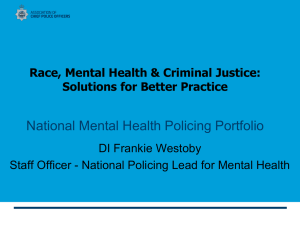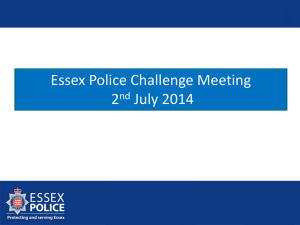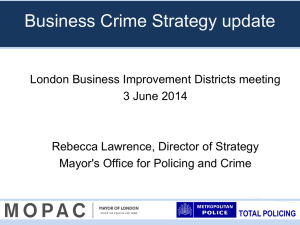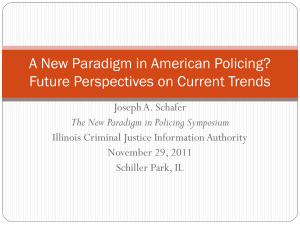Police, Law, and Society
advertisement
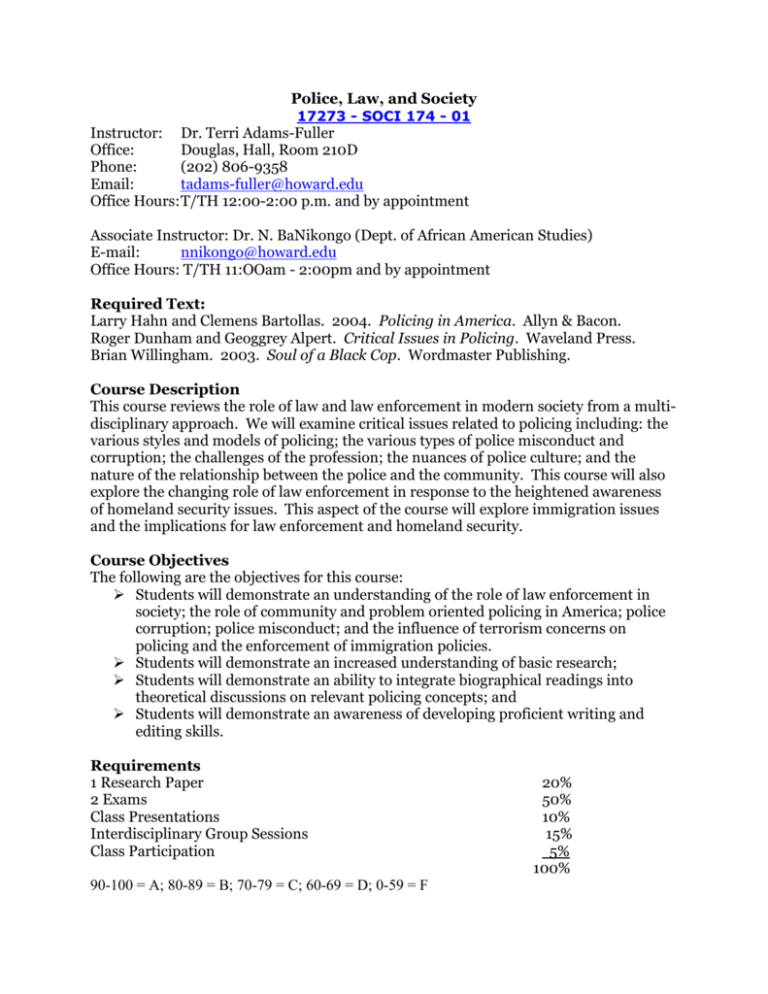
Police, Law, and Society 17273 - SOCI 174 - 01 Instructor: Dr. Terri Adams-Fuller Office: Douglas, Hall, Room 210D Phone: (202) 806-9358 Email: tadams-fuller@howard.edu Office Hours: T/TH 12:00-2:00 p.m. and by appointment Associate Instructor: Dr. N. BaNikongo (Dept. of African American Studies) E-mail: nnikongo@howard.edu Office Hours: T/TH 11:OOam - 2:00pm and by appointment Required Text: Larry Hahn and Clemens Bartollas. 2004. Policing in America. Allyn & Bacon. Roger Dunham and Geoggrey Alpert. Critical Issues in Policing. Waveland Press. Brian Willingham. 2003. Soul of a Black Cop. Wordmaster Publishing. Course Description This course reviews the role of law and law enforcement in modern society from a multidisciplinary approach. We will examine critical issues related to policing including: the various styles and models of policing; the various types of police misconduct and corruption; the challenges of the profession; the nuances of police culture; and the nature of the relationship between the police and the community. This course will also explore the changing role of law enforcement in response to the heightened awareness of homeland security issues. This aspect of the course will explore immigration issues and the implications for law enforcement and homeland security. Course Objectives The following are the objectives for this course: Students will demonstrate an understanding of the role of law enforcement in society; the role of community and problem oriented policing in America; police corruption; police misconduct; and the influence of terrorism concerns on policing and the enforcement of immigration policies. Students will demonstrate an increased understanding of basic research; Students will demonstrate an ability to integrate biographical readings into theoretical discussions on relevant policing concepts; and Students will demonstrate an awareness of developing proficient writing and editing skills. Requirements 1 Research Paper 2 Exams Class Presentations Interdisciplinary Group Sessions Class Participation 90-100 = A; 80-89 = B; 70-79 = C; 60-69 = D; 0-59 = F 20% 50% 10% 15% 5% 100% Student Responsibilities Each student is expected to act professional, come to class on time, and participate in classroom discussions. Students are also expected to respect their counterparts and refrain from using street language in the classroom. This course is designed to encourage classroom dialogue; therefore, you will be required to faithfully read the assigned materials and suggested readings for the course prior to class. Please note that it is your responsibility to contact the professor about missed work if you have an excused absence, to check that you are marked as present if you come to class late, and to return all graded materials to the professor. Your inability to turn your work in on time will result in your work being reduced by 5 points for each day it is late, including the weekend. Students who want to do well in this class should: come to class each session on time; pay attention and ask questions; read all assigned readings prior to class; contribute regularly to class discussions; complete all assignments in a timely manner; and use the professor’s office hours as a resource. Modification of the Syllabi, Missed Exams, and Make-ups On occasions, the syllabi might be changed to accommodate coverage of new or different information. Announcements will be made far enough in advance such that there will be minimal impact on students. Students are expected to take exams on the day scheduled; therefore please forget the concept of “a make-up exam.” Blackboard Students are required to check blackboard at least once a week to review posted information. This is especially important if you miss a day of class (http://blackboard.howard.edu – username: ID number and password: same as your BISON password. If you have any questions about the impact of the weather or other situations on class attendance please check blackboard the morning prior to class. Academic Fraud Cheating involves sharing and/or copying answers from another student, as well as borrowing information from sources without citing the information properly. The latter is called plagiarism and will not be tolerated. Students who are caught cheating or participating in any act of fraud will fail this course. Please also note that the Chair of the department will be notified of the incident and the University’s official policy will be enforced. Reading Schedule The Foundation of Policing The History of Policing Chapter 1 in Policing in America Historical Overview Sections I – Critical Issues in Policing, sections 1-3 The Role and Functions of Law Enforcement Officers in Modern Society Law Enforcement’s Role and Function in Society Chapter 2 in Policing in America Police Operations Blackboard Posting Specialized Roles of Police Blackboard Postings Police Culture and the Personal Cost of the Profession Becoming a Police Officer Chapter 2 – Policing in America Blackboard Postings Black Cop – Entire Book The Police Subculture and the Personal Costs of Police Work Blackboard Posting Police and Stress Chapter 8 – Policing in America Policing Models Community and Problem Oriented Policing Chapter x – Policing in America Community-Based Policing Section VI – Critical Issues in Policing, Sections 20-23 Current Issues in Policing The Impact of Terrorism on Policing Blackboard Posting Immigration Policies Selected Readings The Treatment of Immigrants Selected Readings Homeland Security and Immigration Selected Readings Police Misconduct Nature of Police Brutality and Deadly Force Chapter 9 – Policing in America Police Misconduct and Corruption Chapter 10 – Policing in America Blackboard Posting Police Deviance: Corruption and Controls Section IV – Critical Issues in Policing, Sections 14-17 Use of Force Section VII – Critical Issues in Policing, Sections 24-27 Exams Exam 1 – February Exam 2 – April Research Presentation – March Research Paper - March



